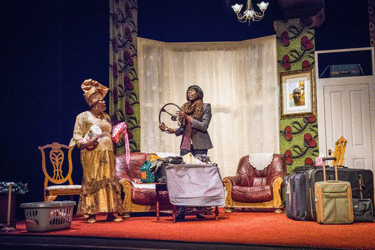Egusi Soup (tour – Bury St Edmunds)
Families are families the world over, whatever the generational and cultural influences which affect them. Janice Okoh’s “Egusi Soup” concerns a British Nigerian family, but that’s not the whole matter. Just its heart.

© Andrew Wilkinson
I've seen this play now at least three times as it developed from a workshop presentation to the fully-fledged production directed by Paul Bourne now embarking on a national tour. The heart of the drama is Mrs Anyia, about to leave her comfortable London house for her native Nigeria and the first annual memorial commemoration of her late husband.
Sharing her house is her younger daughter Grace and Grace's husband Dele, who is finding out the hard way that Lagos isn't London (or indeed the other way round). Expected to join them from a high-powered job in New York is the elder daughter Anne. Circulating around the widow, her house and her son-in-law (not necessarily in that order) is Pastor Emmanuel.
You'd think that Mrs Anyia was leaving for good, such is the extent of her packing for the trip. Anne on her arrival throws cold water on all this preparation; there's a sense that Anne is going to stir up trouble of one sort or another wherever she is, though it develops that there's good reason for her present bout of spikiness.
Grace is one of those people genetically conditioned to make the best of things. Dele wants sons – isn't that what all men need, especially men from a remote Nigerian village? Grace would like him to develop into a proper supportive husband first. It would help if he earned proper money and learnt to save it, not squander it on the 21st equivalent of snake-oil.
There's a splendid set by Nicky Bunch, showing three rooms of the house and all the clutter of holiday preparation. Lorna Gayle's Mrs Anyia inhabits this with just the right sort of authority; she may once have been just a girl from a village, but she was always just that bit sharper and cannier than the others.
Anna-Maria Nabirye's Grace and Gloria Onitiri's Anne make the most of their scene in the spare room where each reveals so much in the simplest of exchanges. Onitiri is especially good as the American career débâcle comes to light, while Nabirye's relationship with Seun Shote's puppyish Dele rings true.
Then there's Richard Pepple as the pastor, sleekly suited with patter and prayers to match. Okoh's play is based on a community which she knows well, but it rings true for so many other uprooted and transplanted peoples.
Fitting in when you come or go to another land, another culture doesn't mean letting go of the place or culture of origin entirely. It means striking a balance. Of course, it might equally mean you walk a tightrope stretched over a ravine. But that's the drama of life for you.
Egusi Soup opened at the Theatre Royal, Bury St Edmunds prior to a national tour.












